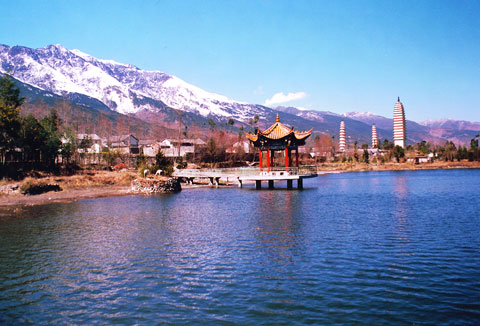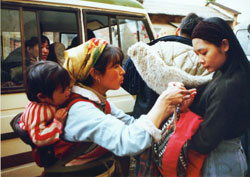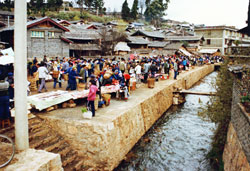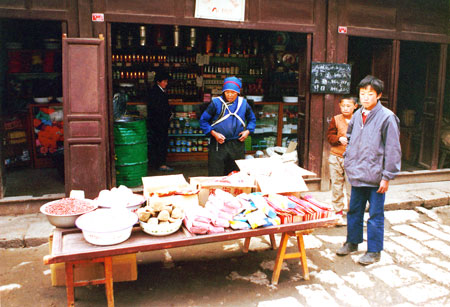
CHINA IS more THAN big cities
Dan Brock has in two previous travel letters entertained Muskelkraft’s (the Danish Muscular Dystrophy Associations magazine) readers with reports on Shanghaj, the Chinese daily life and his experiences as a student at Fudan University. Here follows his third and last article in which he set out for the countryside.

Three stupas at a lake near Dali.
By Dan R. Brock
I hear a loud, shrill sound, when the steam from the train's engine is squeezed through the trains whistle and few seconds after the train starts moving with the characteristic sound of the wheels rolling on the railroad line.
The next two and a half days I will be in our four-bunk compartment. I take the time to update my diary, reading a good book, chatting, eating and sleeping. The window is filthy, so it is impossible to see the landscape.
Immediately we get outside the Kunming railway station, there are a bunch of taxi drivers and curious people, forming a circle around us. It is impossible to agree with the drivers for a fairly reasonable price to drive us to one of the city hotels. So we decide to walk around until we find a hotel where the receptionist did not give us the two most commonly used word in China: ‘Mei you’ (we do not have) on our query about a room, but instead the single word ’you’ (we have).
The trees and shrubs clearly show signs that spring has arrived. The trees along the large main street have spread their bright green leaves to give comfortable shade to the small shrubs and flowers that are about to bloom in red and yellow hues.
Outside the larger hotels we see small groups of Yunnan’s many minorities. It is amazingly beautiful women in very colorful costume. Strong colors are not something we are used to see in the rest of China.
Cover up
The women is trying to sell their beautiful handmade bags and purses. It turns out quickly that their small business is a cover up for changing money. Here in China there are two monetary systems. The coveted and valuable FEC or foreign money and the people's money, Renminbi. Officially, the price is the same but on the black market the rate is 110. It is obviously an illegal exchange, and news broadcasts regularly shows the police catching the black market sharks.

Women trading in a market near Dali.
Soon as we have left the main street and come to one of the small streets, it is difficult to grasp that we actually are in a provincial capital. There is hardly any cars, and lots of activities in the streets. Many of the stores have been expanded with a small booth on the sidewalk. The butcher has also moved his business outside to make the final carving of his specialty, which he advertise by leaving a horse standing on the counter and a couple of horses' tails hang down from the awning.
Beijing Opera in the open
It is Sunday, Jens and I is going to the city park. The sun has for several hours broken through the layers of clouds and is now on its peak at the sky. We end up at a small pavilion, where a small group of elderly sit and chat. Among them, two elderly women and a middle-aged couple are sitting putting on a thick layer of makeup. In some strange way, their furrowed faces changes to characters from the Peking Opera.
During the hour-long make-up, many arrive. We have gradually formed a complete ring that marks the scene. It seems that it is a recurring event, as some apparently knows the players and even has brought little stools. The man has now donned costumes of Peking Opera and started the play with a high rising voice. A little later he is accompanied by one of the older women. Although costumes are not as flashy, the song is not as clear, and the acting is not as professionally as the established scene in the capital, the atmosphere is topnotch. All clap and laugh loudly as the story progresses.
Everyone has showed up. There is the old, gray-haired man with white beard in his blue Mao suit, which mostly resembles one of the ancient Chinese philosophers. An old, blind woman who sits rocking on her stool. Some Yi-women who have tied their long black hair with red and yellow ribbons, and let it hang down their colorful costumes. A little girl with a rabbit mask. And beside me sits an old woman, showing a toothless mouth every time she open her mouth in a big grin. There is a wonderful atmosphere of relaxation and cohesion, which I don’t believe can be found in the busy Shanghai.
People as Resource
We managed to get tickets for the bus, to take us up north to Dali, although suddenly there are no more tickets as they realize that the wheelchair has to come too. By paying extra for the chair, in some strange way there are seats available.
After strenuous efforts and through great perseverance we get the chair wedged onto one of folding seats in the bus, so I fortunately can be seated in the wheelchair.
Already an hour after we have left Kunming, it becomes mountainous. Unfortunately many of the hillsides, is a poor sight, because it is clear that the Chinese has ruthlessly exploited the vast woodlands that once stood here. Many of the hillsides are completely barren, and where there is a replanted tree it is fast growing conifers, which can soon be cut down again.
Everywhere we see tiles and bricks being made. Most of the stones are burned, but some are pressed and then sun-dried. Their color varies from gray to brown to reddish, depending on the color of the soil in the area. Therefore, the houses also have different colors, which can change from village to village.
In between the villages there are big, beautiful yellow rape fields. Everywhere I see people drudge and work hard. People are dragging on loads, which is almost bigger than themselves. Some is weeding the large fields. Others is repairing the bad roads with small picks. It is rare to see machines being used for work that humans can do. In China, human resources will be exploited.
The West has come to Dali
After almost nine hours of mountain driving, we reach Dali, located in 2.200 meters altitude.
It is a small town, which is partly inhabited by Han Chinese, and still many of the peoples who originally lived in the area before it were incorporated into the great Chinese empire. Only in the early eighties, the city was opened to foreign travelers, which obviously has characterized the town. One after another western influenced restaurant or cafe is now placed along the main street. Places where backpackers can relax from mainland China and meet with like-minded, while a hamburger or pizza slips down.
Outside each of these ‘hang-arounds’, a group of women from one of the minorities are trying to sell their incredibly elaborate, handmade silver jewelry and tie dye clothes. I cannot help thinking how sad it is, that their lives have been reduced to street vendors, but I hope that the little foreign money they earn may help them to remain in their own territory without having to move to a large Chinese industrial city.

At a maket in Lijiang.
It is a fantastic area. To the west lie the high mountains which have not yet taken off its white winter woolly hat. And to the east is the large freshwater lake. Around the lake there are small fishing villages. I can see the fishing boats slightly rocking in the blue water, while women and girls are busy on the shore washing clothes and naughty kids with snot running from their nose and down their faces stares at us foreigners.
Naxi-people is threatened
Although Dali has a nice, friendly and warm atmosphere, and nature around the town is very great, my curiosity drives me, after a week or so, on a six-hour long bus ride further north to the town Lijiang.
The old part of the town is almost entirely wooden houses with a ground floor, which are often designed for business, while the first floor is used for habitation. Behind some of the houses I can glimpse the small courtyards where spring flowers are in full bloom.
The town is crossed by a river that splits into smaller channels, which frequently is used to prepare the evening meal. Chicken and vegetables are cleaned in the cold, crystal-clear melt water, which flows in channels along the cobbled streets.
This part of town is mostly inhabited by the Naxi minority, which was once a great nation with their own religion and own written language. Although they are still trying to retain many of their traditions and customs, it is difficult to maintain their old lifestyle with the massive Chinese influence, they are being exposed to.
While my kidneys are being shaken by going over the uneven stones, I touch my chin and discover that my beard has grown a lot. At the same moment I see a barber shops and immediately approach it. I do however have major concerns when I see the barber's blood-stained coat. But ten minutes later I’m on the street, shaved, and 10 penny poorer.

A couple of kids at a stall in Lijiang.
Reserve tank emptied
We've been away for almost four weeks, and it's time to go home to Shanghai.
With fever and cough, I try to keep myself fairly upright on the hard bus seat. However, it is quite impossible when the driver believes that any hairpin turns has to be attacked with absolute maximum speed. In all of the ten hours we drive before we get a break for an evening meal, I flex my muscles, as much I can, which is not much. It has no great impact, because I constantly feel that my head is pulling my neck bones apart, when it is thrown from side to side.
To our great surprise, it turns out that the bus not only pauses briefly, but doesn’t continue until the next morning. We find someone who knows someone who has a small pickup truck with a covered platform. We can just squeeze ourselves into the truck bed along with our entire luggage.
The next five hours drive, we are bouncing and shaking along the bumpy mountain road that is illuminated by the bright moon in the cold clear sky.
When we arrive in Kunming, I am happy to be allowed to sleep on the couch in the lobby. I have for the last many hours been running on the reserve tank, which now is completely empty, and I immediately fell in deep sleep.
Next day I sit in a train heading for Shanghai.